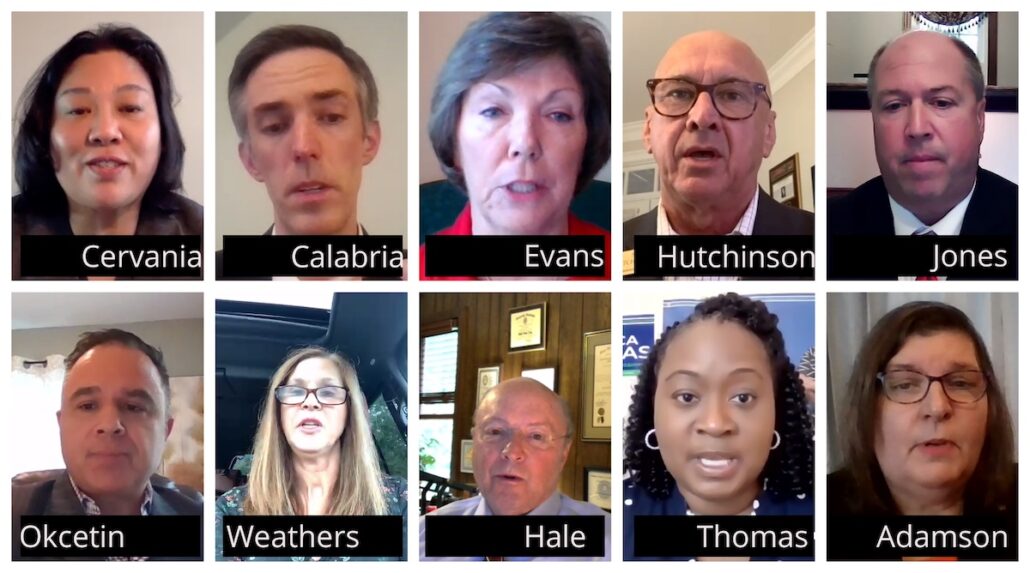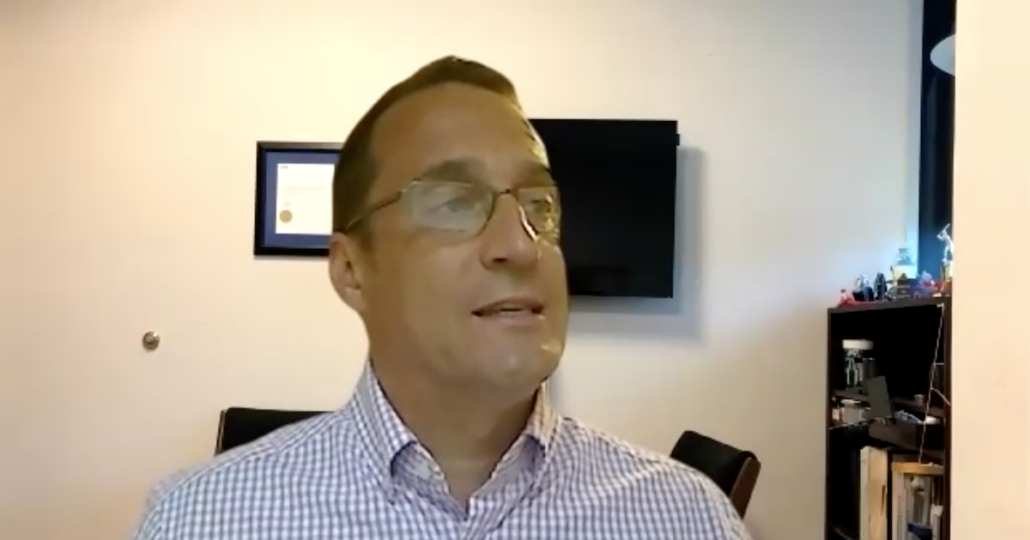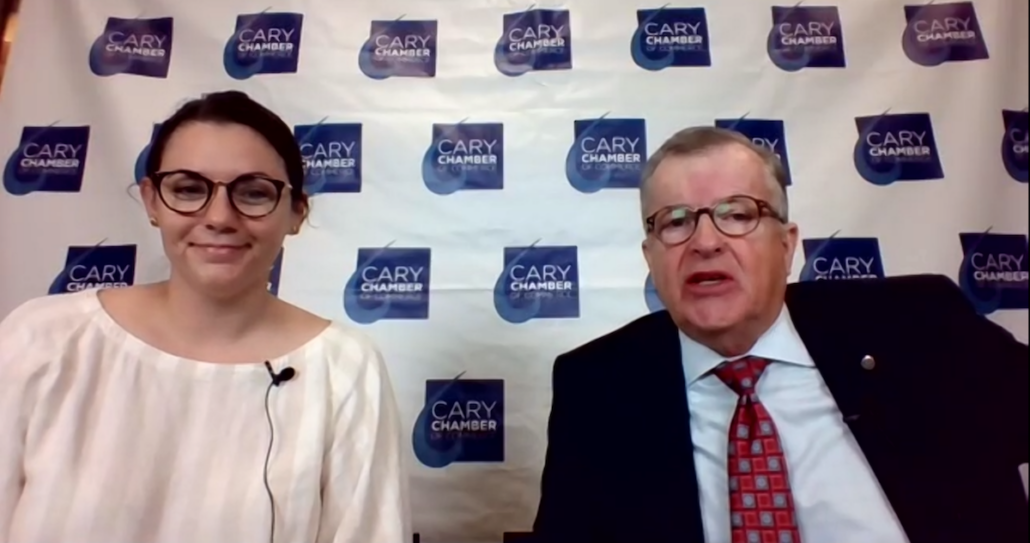Wake Commissioner Candidates Debate COVID Comeback, Transportation
Cary, NC — In a virtual forum Wednesday morning, the Cary Chamber hosted 10 of the 11 candidates vying for a spot on the 7-seat Wake County Board of Commissioners.
The debate focused on how to recovery economically from COVID-19 and what the top priority should be in transportation.
The Turn of a New Term
The Wake County Commissioner candidates will be on the back of the ballot for voters in the 2020 General Election. Of the 7 current commissioners, 5 are running for reelection with 3 running unopposed in their districts.
An important thing to note for voters is that these candidates are elected at-large. This means voters are not tied to only electing their in-district candidate(s), but can vote for their favored candidate in all 7 districts.
Looking at the upcoming election through a 2-party system lens, the current board’s members all fall within the Democratic Party. This is a point that the four Republican candidates pointed out in this week’s forum with hopes to soon change that statistic.
Putting Faces to the Names on the Ballot

The beginning of the forum was open for each candidate to give their own 1-minute introductions. In the order they will appear on the ballot, here’s the gist of what they had to say.
Sig Hutchinson (Democrat, District 1)
- Wake County Commissioner since 2014, has served as chair and vice chair previously.
- Has 25 years experience in working with communities including in the areas of transportation, parks and greenways.
Greg Jones (Republican, District 1)
- Has experience in business and public service.
- Wants to bring balance back to the board with a conservative voice and values.
Maria Cervania (Democrat, District 3)
- Has a background in biology and epidemiology with a career in public health and government for over 25 years.
- Has worked in planning and crisis management during the HIV/AIDS epidemic and the H1N1/Avian Flu epidemic.
Steve Hale (Republican, District 3)
- US Army veteran with experience working for the Wake County Sheriff’s Office and NC Department of Public Safety.
- Has lived in Wake County for 65 years and worked in Wake government for 40 years.
Susan Evans (Democrat, District 4)
- Current commissioner for District 4 with a background in accounting and business.
- Previously served on Wake County School Board and works part time for a non-profit.
Karen Weathers (Republican District 6)
- Running with the promise to return the voice of the people to the board.
- Main areas of concern are in education, taxes, spending and public safety.
Shinica Thomas (Democrat District 6)
- Wants to see more diverse ideas and strategies come to the board.
- Has a background in advocacy and education for young women as well as non-profit work.
Faruk Okcetin (Republican, District 7)
- Is an immigrant and small business owner seeking to protect and preserve Wake County.
- Wants to focus on issues of spending, debt and public safety to improve quality of life.
Vickie Adamson (Democrat, District 7)
- Current vice-chair of the board of commissioners with a focus on public health responses, more funding for schools and affordable housing.
- Serves also as Chair of the Arts Commission, Vice-Chair of Health and Human Services and is the Liaison to the Greater Raleigh Convention and Visitors Bureau.
Matt Calabria of District 2 was not on the call at the time of introductions and James West, running unopposed in District 5, did not attend.
Economic Recovery from COVID-19

The first question, asked by Eric Hunley of Cary Chamber Board of Directors was, “How do you plan to meet the changing needs of our county following the economic impact of COVID-19?”
Weathers, who was the only candidate reporting live from her car, responded that her priority would be to reopen the community, focus on new ideas and establish better fiscal responsibility. She ended with a nod to President Trump’s famed slogan.
“As we’re here, you know, making America great, let’s make Wake County great,” said Weathers.
Thomas answered that a data-driven approach to returning kids to school is the way to go. Following the crisis, Thomas sees there being a need for better medical and emotional care in schools.
Jones doubled down on his top priority of ensuring public safety immediately followed by saying the county must re-open the public school system and get its spending under control.
“If you add up our cumulative debt since 2014, it would be enough to fund our whole school budget for an entire year just in interest alone on that debt,” said Jones.
Okcetin shared a specific plan of his called PEP — Preserve and protect public safety, have efficiency in spending to reduce county’s billions of dollars in debt and achieve prosperity together.
Hutchinson and Evans chose to highlight what the current commissioners have already done to meet needs of the county during the pandemic. This included programs providing small business loans, a $1 million contribution to Wake County’s artist industry, free testing, meals, and aid for utility and rent payments.
Hale was the first to frame the impacts from the pandemic as a potential catalyst for new growth and potential with many businesses and individuals looking to NC for relocation.
“I see this, hopefully, as an opportunity to grow Wake County in a different way,” said Hale.
Cervania answered with 3 keys areas of focus under the umbrella of economic development — marketplace, workforce and community. Adamson said that to keep recruiting businesses to the county, Wake needs to protect its quality of life and talent pipeline. She also addressed the topic of the county’s debt as several newcomers to the race named it as a major issue.
“For a county our size, our debt is actually on the low end and we have a AAA bond rating,” said Adamson. She added that most of the debt has been voter-approved for building schools, libraries and investing in Wake Tech.
Matt Calabria, a current commissioner representing District 2, joined in on the call in time to answer. He highlighted much of what Hutchinson and Evans had said including small business loans, housing support and using CARES Act funding strategically.
Biggest Priority in Transportation

Perry Price, Director of Education & Government Relations and Chamber President Howard Johnson.
A second round of responses came after asking what the candidates view as the biggest transit priority for Wake County. The hot topic was light rail and commuter rail.
For reference, light railways are powered by overhead electrical wires and often require their own tracks while commuter rails systems can operate on existing tracks.
Weathers and Jones were the most adamantly against the concept of light rail, stating that the county could not afford it. Jones went on to say that several hundred million dollars were wasted in Wake, Durham and Orange Counties when a light rail proposal failed.
Hutchinson later assured that light rail was a failed system in Durham and Orange Counties, but never lost Wake County a cent. He continued to voice his support for commuter rail systems instead, saying that 6 of the towns and cities of the Triangle will be connected by rail over the next 5-6 years.
Evans added that there has never been a plan for light rail in the Wake Transit Plan created in 2014, 15 and 16.
Adding to rail discussion, Calabria said one of the number one asks from the Cary community when formulating the 2016 transit plan was for a strong commuter rail system for better connectivity to the region.
“Unlike what’s been said previously, this plan does not contribute to our debt load whatsoever because it’s paid by a separate entity, GoTriangle, through a dedicated tax. It’s a closed system and does not effect our tax rate, the County’s debt burden, the ability to build schools or anything else,” said Calabria.
Hale, having had railway experience while living in Europe serving in the Army, said it’s a beautiful way to travel, but does not have hope that it would work in this region where people “love their motor vehicles.”
Thomas favored expanding Wake’s railway system and seeing bus capacities and times expanded. She also hit on what a big expense transportation is, ranking alongside rent and insurance.
“We can’t pave our way out of a transit problem,” said Thomas.
Adamson echoed this sentiment and said the greatest priority for her will be sticking to the current transit plan set for the county.
Okcetin and Cervania took different approaches outside the box of rail and bus. Okcetin cited a priority of more cost-effective, environmentally sound vehicles while Cervania voiced that it needs to be an integrated system with bike and pedestrian elements.
The forum concluded after an hour and 20 minutes. Look for more candidate forums in the coming weeks reported on by CaryCitizen.
Story and screenshot images by Ashley Kairis.
All the Cary news every day since 2009. Subscribe by email.




Great job on non-partisan reporting of this event. I feel like I got to know all of the candidates a little bit better before I vote.